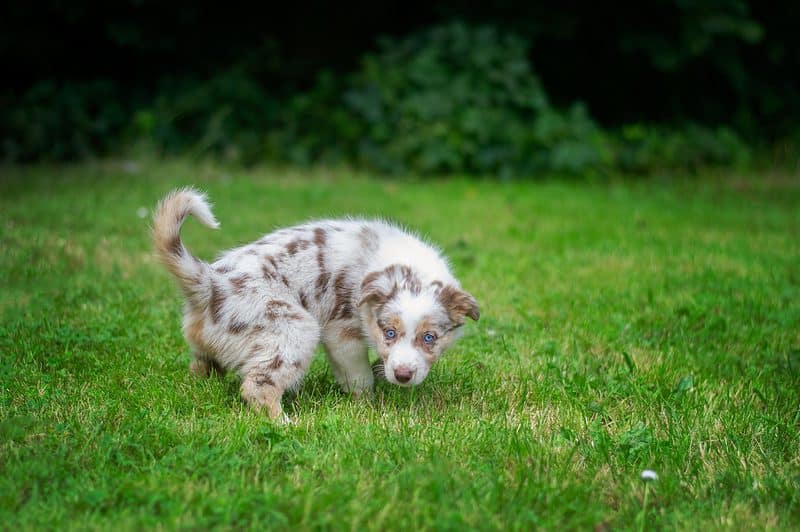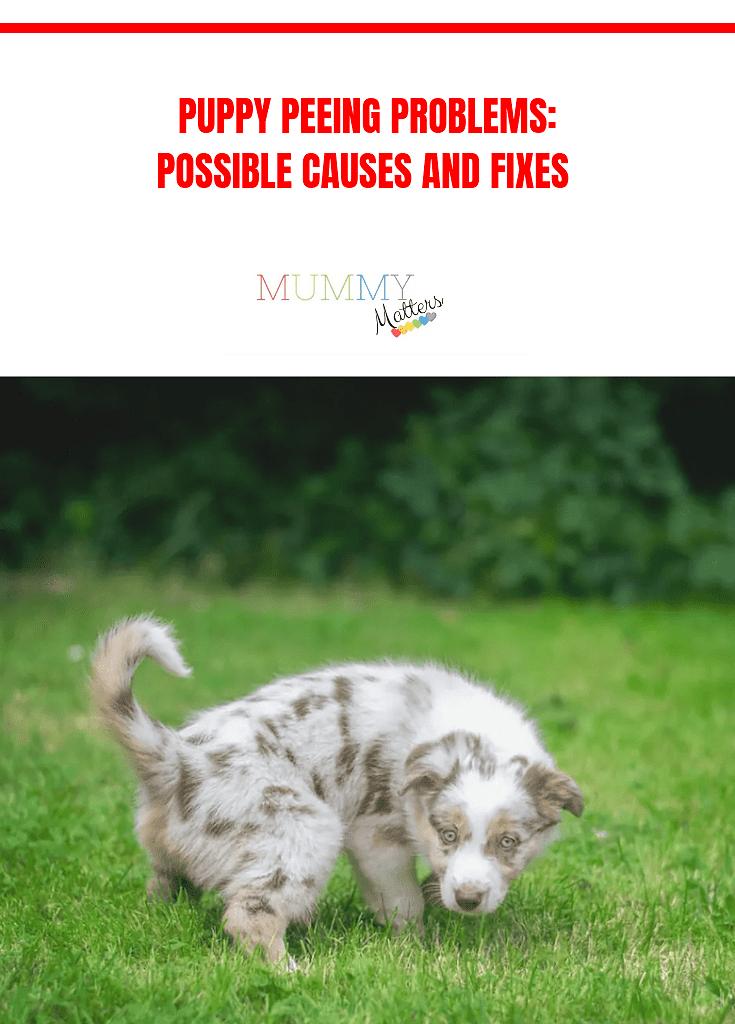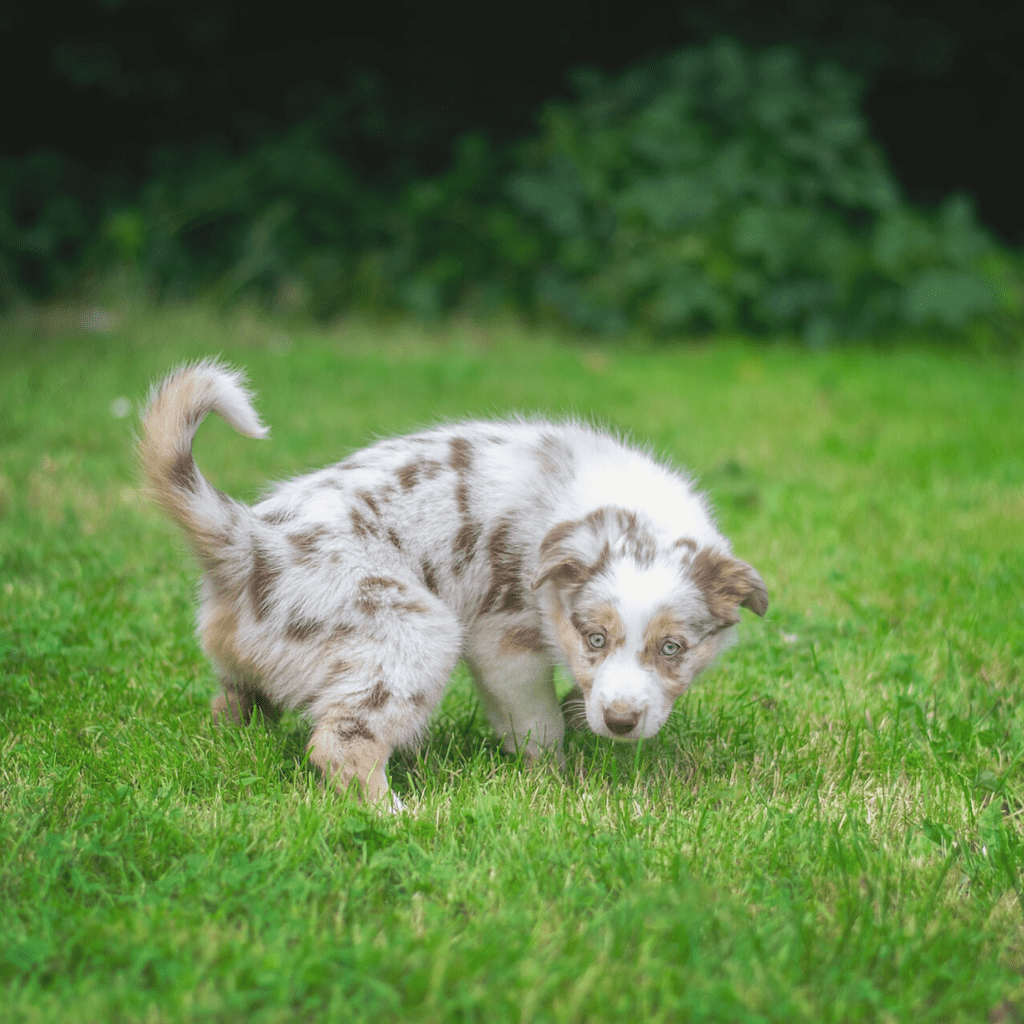Are you worrying because your puppy is peeing a lot? It is a valid concern because frequent urination may be a warning sign that your puppy is sick.
It is best to observe your puppy more closely to notice any other changes. If the puppy is in distress (no appetite, can’t move or moves strangely, has a stiff stomach, drools excessively, or howls in pain), or if there is blood in the puppy’s urine, go to the vet immediately!
If everything seems fine, read on to learn more about potential causes and remedies for the problem.
Normal Urination Frequency of Puppies
A puppy is peeing a lot if it pees more often than usual. So, how frequently should a puppy pee?
Puppies have tinier bladders, so their urine drains out more quickly. They also have not mastered bladder control and will urinate even if their bladders are not full yet. Complete bladder control usually arrives at four to six months of age.
According to the American Kennel Club (AKC), puppies can hold their urine for a number of hours, the same as their age in months + 1. So, a three-month-old puppy can only hold its urine for four hours. So, it will pee around six times a day.
Why does my 4-month-old puppy pee so much? If you’re asking this question, count if it is peeing every five hours or around five times a day. If yes, it’s normal.
Reasons For Increased Urination Among Puppies
Sometimes, a puppy may urinate more frequently for reasons you need not worry about:
A Change In Diet
Food affects urination. Some meals or treats may contain a diuretic ingredient that triggers urination. Salty food and some fruits and veggies can cause this effect.
Giving your puppy something with high water content, such as broth, watermelons, and green beans, can also fill its bladder more quickly.
Medication Side Effect
Is your puppy taking medications? The increased urination may be a side effect of this. Read the drug insert and check the list of side effects. Otherwise, ask a vet if it is normal for your puppy to urinate more because of some meds it takes.
Be careful: excessive urination can mean the kidney or liver is damaged. Don’t forget to tell your vet!
Increased Drinking
How’s the weather? If it is hot, your puppy may drink more without you noticing. Does the puppy have playmates? If yes, it may play harder than usual and get more thirsty. This is usually the case for a puppy peeing a lot suddenly.
Marking Territory

Puppies begin to mark their territory using their urine when they are six months old. Male dogs urinate to attract females with their scent.
Many dogs, including females and neutered ones, sometimes leave their urine in places they regularly visit to ward off other dogs and threats.
Illnesses
The answer to “Why does my puppy pee every 20 minutes?” may depend on your puppy’s health.
Ailments that may cause an increased frequency of urination are:
Urinary Tract Infections (UTIs)
A puppy peeing frequently small amounts of smelly and cloudy urine may have an infected urinary tract. Many things may cause UTIs, which lab tests can detect:
- Bacteria
- Mineral accumulations
- Inflammation
- Cancers of the urinary tract
- Allergic reaction to medication or a urinary catheter
Abnormally Weak Bladder
As mentioned earlier, a puppy typically has a weak bladder because learning how to control it takes time. However, some puppies may be born with bladder deformities or be injured, so they can’t keep their pee even if they are old enough. A puppy peeing every 5 minutes may need medical attention.
Diabetes
Canines can also develop diabetes; in fact, 1 in 300 dogs and cats have it. It usually occurs among middle-aged dogs but can also be found in puppies. As with humans, diabetes can be inborn, but it can also develop because of too much sugar consumption.
A symptom of diabetes is frequent urination. Blood tests and urinalysis can check for sugar levels in a puppy’s body. However, expect that other tests will be given since diabetes is uncommon among younger dogs.
Although diabetes can occur in dogs, it is uncommon among puppies.
Serious Injuries
A brain injury or damaged spinal cord may cause a puppy to experience urinary incontinence or be unable to hold its pee. There will be other noticeable changes when this happens, such as paralysis or abnormal movements.
Frequent peeing may be a symptom of a severe injury. Seek urgent care if your puppy has recently been in an accident.
Behavioral Causes
A puppy’s emotions may also affect its peeing behaviors. An anxious puppy may pee to show submissiveness to others it thinks may harm it. It may also pee as a response to stress or fear.
Remedies For Puppies With Increased Urination
Before anything else, please consult a vet when your puppy is peeing more than normal. Lab tests and assessments will help your puppy get the treatment it needs.
However, if you think it’s not serious, you might solve the issue with slight adjustments to your puppy’s routines.
Watch your puppy’s activities. If it is hot, or if your puppy is more active, it is likely to take frequent trips to its water bowl. Remember to give it additional potty breaks, especially with a puppy peeing a lot in the house.
If you suspect the puppy’s new diet is causing the pee problem, stop giving it and return to its usual meals. You could also try giving it something that’s not too salty or sugary.
In case you are wondering what food and drink to give your pup and what to avoid, Paul Andrews, Author of The Upper Pawside gives a comprehensive dog food guide.
If urine marking may be the problem, consider spaying. You can do this as early as six months. Try to bring the puppy to a place that is free of other dogs or other things that may be scary.
In the unfortunate event that a serious illness or injury is involved, your vet will guide you on what to do next. Remember to be patient with your puppy because it may need some time to recover and regain its regular peeing habits.
Conclusion
When your puppy is peeing a lot, it can be normal or abnormal. Bring the puppy to the vet if you notice bloody urine, if it is behaving abnormally, or if something doesn’t look right.
Are you wondering, “Why does my puppy keep peeing every 15 minutes?”
Ask these questions. Is your puppy drinking more? Did it eat something new? Is it feeling threatened? Is it six months or older and trying to attract mates?
Considering these additional factors may help you find the cause and address it accordingly.


